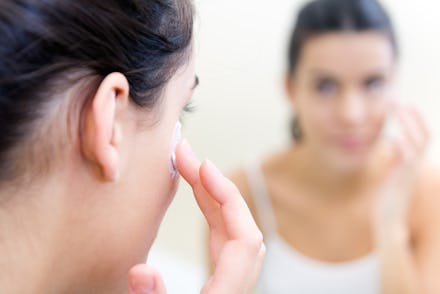How young is too young to start using anti-aging creams?

Just like you probably remember your first grey hair, you likely recall your first wrinkle, assuming you've experienced your first of either.
With so many products on the beauty market advertising special anti-aging or youthful glow-inducing serums — the celebrities in these campaigns looking like they haven't aged in years, it's tempting to use anti-aging skincare products when we're young.
Mic decided to ask dermatologists at what age they'd recommend starting to use these creams to either prevent the effects of aging or attempt to remove said effects if they've already happened. And, as it turns out, you might actually want to start using these items sooner than planned.
While it depends on the individual, Dr. Paul Jarrod Frank suggests that people begin to use anti-aging skincare products in their late 20s to mid 30s.
"In your 20s it's all about preventing anti-aging," he said in an interview. "Keep it basic. I say cleanser, moisturizer and sunscreen are the most important steps you have to take to prevent aging."
RealSelf contributor Dr. Sejal Shah added, "Because I consider sunscreen part of any anti-aging regimen, you're really never too young to start."
Look for these key ingredients
When you do chose to start using anti-aging products, in addition to sunscreen, Dr. Frank says to look for items with antioxidants such as Vitamin C. "If your skin isn't sensitive and the antioxidants are not effective, use a product with retinol," he explained.
"As your skin matures, I recommend adding in hyaluronic acid and growth factors and peptides," said Dr. Shah.
What exactly do anti-aging products do to your skin?
Different ingredients are meant to target different areas of the skin, but all work to prevent and/or reverse signs of aging, like wrinkles, skin texture and discoloration, explained Dr. Shah.
"Vitamin C is a powerful antioxidant that can protect against damage caused by ultraviolet radiation," she said. "In addition to preventing skin damage, it can boost collagen and elastin synthesis, which can improve wrinkles and skin texture."
Alpha hydroxy acids, like glycolic acid, work as exfoliators and result in smoother and brighter skin, Dr. Shah said.
Lifestyle choices affect aging
There are ways to prevent aging, or at least minimize its effects, without products. Similar to Dr. Shah who said that "sunscreen is the foundation of any anti-aging regimen," Dr. Frank emphasized its importance, saying you should wear it 365 days a year. (Many everyday beauty products, like foundations and concealers, often contain SPF.)
"Lifestyle factors that are important to prevent aging are [to] quit smoking, get enough sleep, reduce your stress levels, drink alcohol in moderation, exercise regularly, eat a healthy well-balanced diet with adequate protein, fat, vitamins and minerals [and] also try to eat antioxidant-rich foods and avoid high glycemic foods as much as possible," she said.
And don't forget to gently wash your face twice a day to remove dirt and makeup that could irritate or damage your skin. That is a major key.